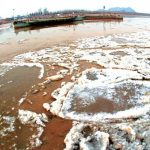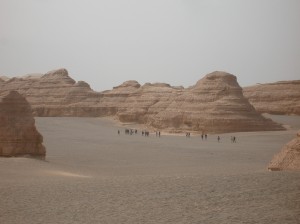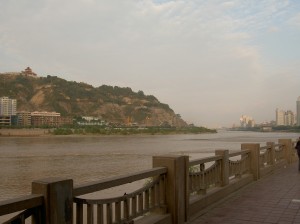Water, water, everywhere? China’s Water Crisis (缺水) Posted by Stephen on Oct 23, 2011 in Uncategorized
China is facing a dire fresh water crisis and it’s only getting worse. After decades of environmental degradation, desertification and pollution, China’s arable land, waterways and aquifers are drying up, adding to concerns of an eventual water shortage that could have devastating repercussions on the Chinese economy and society. Now with the approach of summer and a continued drought, water scarcity or 缺水 (quē shuǐ) is on the tip of everyone’s tongue.
 The two main threats to China’s fresh water supply are loss of arable land and the increase of toxic chemicals and pollutants that are making their way into China’s main rivers, lakes and water tables. Click here for an a recent article on toxic dumping, despite government ban here.
The two main threats to China’s fresh water supply are loss of arable land and the increase of toxic chemicals and pollutants that are making their way into China’s main rivers, lakes and water tables. Click here for an a recent article on toxic dumping, despite government ban here.
In the increasingly dry, desert plateau of the North, creeping sands are replacing river basins. In the South and Eastern se tropical sections of China, toxic-runoff and pollution are tainting water supplies, making them dangerous to drink, while poisoning local fish and wild life.
All of this has been exacerbated by a series of summer droughts and increases in average temperatures and severe weather. Yet, the Chinese are never ones to back down from nature, as can be seen by their attempts at weather control in a previous post. In fact they have quite a grandiose plan to rehydrate the dying north.
Beijing is planning a $62 billion dollar water diversion project that will bring water from southern and eastern China some thousands of miles north to the increasingly desert plateau. This ambitious project will cost twice as much as the Three Gorges Dam (the largest hydro-electric dam in the world), and will annually pump 6 billion gallons of water to the north.
http://www.youtube.com/watch?v=RXzdDH_jsk0
Yet, many critics of the project say it neglects the inherent environmental problems plaguing China, and is only a short term (and expensive) solution to a long-term problem. Further, due to the growing pollution in Southeastern Chinese water ways (the Yangse has become so polluted that the “cradle of Chinese civilization” is becoming a wasteland), many worry that this may ameliorate water shortages in the North at the expense of the South. For more on this debate check out a NYtimes on China’s water crisis.
It appears that after decades of unbridled economic growth and industrialization China’s chickens are coming home to roost. Some experts believe that the cost of China’s 9% plus annual GDP growth is offset by the long-term costs associated with pollution and environmental degradation.
While China struggles with food and energy policies, water is now emerging as an integral component to these industries. Feeding 1.4 billion people is no easy task, especially as demand for livestock and meat continues to grow. Water, seen as the ultimate “public good,” is becoming a scarce commodity, and it’s affecting Chinese society in just as profound a way as an oil shortage or morgage crisis would.
As a result China’s continued growth an prosperity rises and falls with the ebb and flow of its water table. And this prolonged drought is likely to get worse, before it gets better.
Confucius, speaking on the topic of water, once said, “When it flows, although sometimes in low places and sometimes in high places, it certainly follows one principle. It flows just like justice.” Unfortunately for the Chinese, “justice” is drying up. What little is left, I highly suggest not drinking.
Follow Steve on Twitter: @seeitbelieveit

Build vocabulary, practice pronunciation, and more with Transparent Language Online. Available anytime, anywhere, on any device.
About the Author: Stephen
Writer and blogger for all things China related. Follow me on twitter: @seeitbelieveit -- My Background: Fluent Mandarin speaker with 3+ years working, living, studying and teaching throughout the mainland. Student of Kung Fu and avid photographer and documentarian.






Comments:
Rob Roy:
China must revert back to a balance of smallholding farming planting trees and not make the mistake of England and America,Industry with wealth is not the future